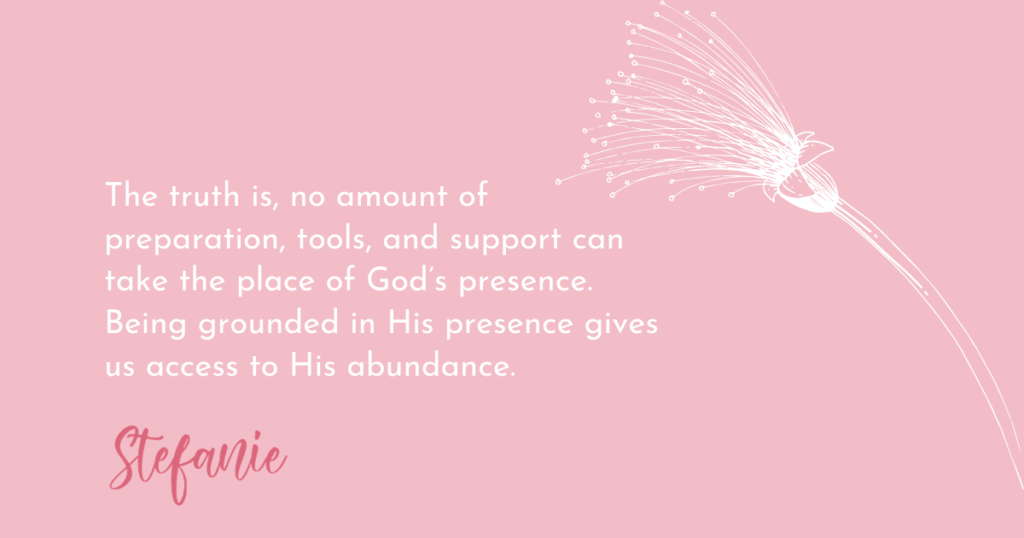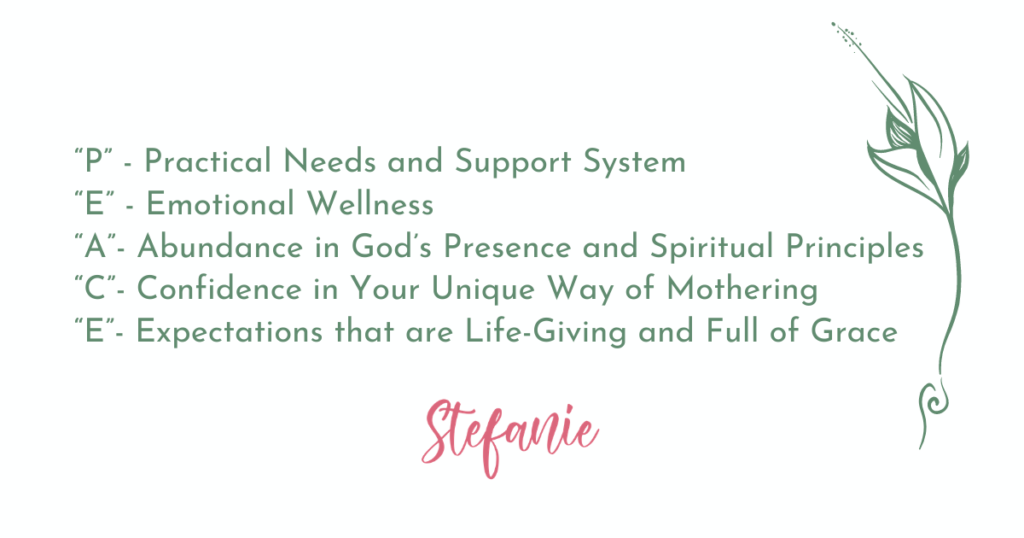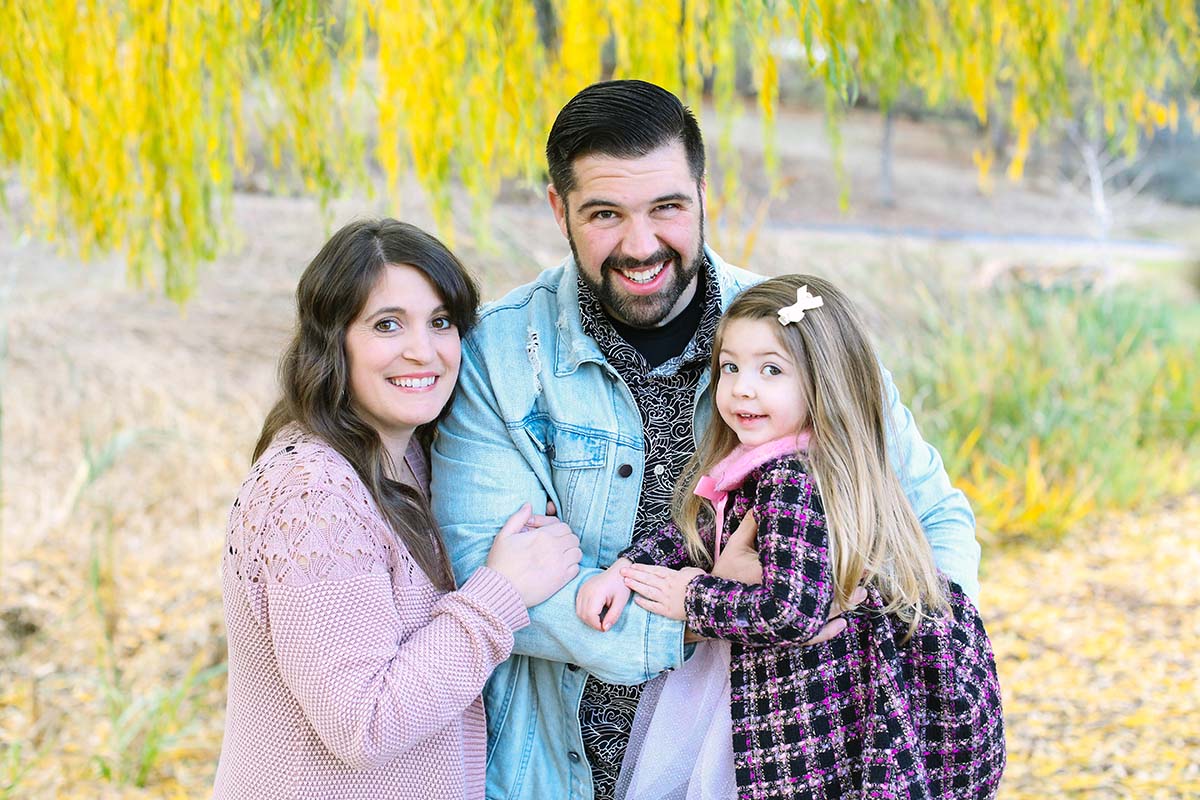Did you know that you will experience a fourth trimester in pregnancy? It’s the unspoken season that we most often refer to as postpartum. But the truth is, it is just as important as the previous three trimesters—it is a season of deep growth, change, and identity!
In case you missed it, I recommend heading over to PART 1 of this article where I share more about what postpartum is, why it’s so important, and how to begin preparing for a victorious postpartum season.
Here is the beautiful truth about postpartum: God is capable of doing a special work behind the scenes as we navigate the highs and lows of our postpartum season. And that is His heart for you.
In this article, I share all about the method I developed after a very rough first birth and postpartum experience. My goal is to provide as many tools as possible to help other mommas have a peaceful and memorable postpartum season. This is by far my favorite tool to share as it comes straight from my personal experience.
The PEACE Method
I believe there are some key factors that make all the difference in a mother’s postpartum experience. When we are equipped with the right knowledge, tools, and support, postpartum can be a time of flourishing.
The PEACE Method is what I used to go from a rough first postpartum experience to a much more full and peaceful experience with my second child. Below you’ll find a key point from each section of my PEACE method approach to postpartum. Keep in mind this is just a snapshot. There’s so much I love to share about this method, and I’ve got some exciting plans for using this tool to help other mommas have a more peaceful and enjoyable postpartum.
“P” – Practical Needs and Support System
Of all the categories of the PEACE method, this one needs the most forethought and planning. We tend to put lots of effort into making a birth plan, preparing for labor and delivery, creating a baby registry and decorating the nursery. But it’s easy to forget just how much momma benefits from her practical needs being cared for within a support system after birth.
After giving birth, it’s important a mother has the ability to rest and physically recover. She’ll want to plan to have items on hand to help heal the perineum and care for her breasts. She’ll need even more support if she happens to have a cesarean section, which is considered major surgery. Also, our nutrient stores are commonly depleted during pregnancy, so quality nutrition and likely supplementing with a few nutrients is important in the months after giving birth. It’s a great idea to have a meal train after delivery, but I recommend taking it up a notch and preparing freezer meals at some point during the second or third trimester.
A support system is key for postpartum, and it’s a good idea to evaluate the various circles of support we have ahead of time. Who lives at home with mom, and what kind of support can they offer? Can they help with nighttime feedings or school drop-offs for older children in the first few months? Who can help with caring for older children or watching the baby while mom takes a shower or a nap? Is there anyone to help with household duties or grocery pick-up during the early months? What friendships or family relationships can mom call upon for emotional/mental support?

It will likely take some planning ahead and creativity to arrange some of these types of support, especially the ones that cost money, like childcare. It’s a good idea to become familiar with community resources ahead of time. Is there a local MOPS group or church that offers a “Mom’s Day Out” type program? Are there parenting groups or breastfeeding support groups that can be joined during pregnancy to meet other parents who mom could potentially trade childcare with eventually? Sometimes a trade of services can be worked out. For example, my sister offered to deep clean my house a few weeks before my due date in exchange for a number of jars of homemade elderberry syrup that I make. Though it may not come easily, attempting to arrange some support ahead of time is well worth the effort.
Another note is to arrange ahead of time certain professional help. If you’re serious about breastfeeding, I highly recommend finding a lactation consultant ahead of time so you have one ready if you have questions after delivery. Be sure to find one who knows how to diagnose tongue and lip ties, which are fairly common. It may also be helpful to have a chiropractor ready in case you or baby need an adjustment after delivery. And lastly, having an idea of what mental health resources are available through your insurance, community, or church may also be a good idea.
“E” – Emotional Wellness
A lot of factors influence emotional wellness during postpartum, especially hormones, stress, lack of sleep, and being depleted of certain nutrients. It’s important to know the difference between “baby blues” and postpartum mood conditions. The “baby blues” are a normal period that lasts the first 2-3 weeks after birth, where mom may experience extra tearfulness, moodiness, irritability etc. and they usually resolve on their own. Postpartum mood conditions have a wider variety of symptoms including anger, inability to sleep, intrusive thoughts, anxiety in addition to sadness, feeling overwhelmed, and some of the other symptoms in common with baby blues. But these symptoms are usually more severe and they worsen over time. Postpartum mood conditions need some kind of treatment to improve, whether that’s talk therapy, medication, natural remedies, etc.
It can be helpful to have an idea ahead of time about what strategies are helpful in managing stress. In conjunction, it’s a good idea to have a list of ideas of how mom can care for herself and feel refreshed. These don’t have to be complicated; they can be as simple as a special face cleanser, a comfy robe, an essential oil diffuser, or favorite tea. Avoiding isolation is also key, so having a list of a few close friends or family members to reach out to for support is also important. These factors are very individual, but the last thing mom needs to do is figure out how to manage stress, what self-care strategies are helpful for her, and who to reach out to when she is already stressed and in need of help.
One other practice that may be helpful is to complete a mini self-assessment each day. Moms may want to ask themselves questions like: When was the last time I ate something nourishing? How much water have I had to drink? When was the last time I showered, changed clothes, brushed my hair, etc? When was the last time I got some fresh air? Have I had any social contact with friends or family lately? After taking inventory, it’s not necessary to address all these areas at once. A better idea is to ask: What’s one thing I can work on today to better care for myself? Just choose one small aspect to focus on each day.
“A”- Abundance in God’s Presence and Spiritual Principles
The truth is, no amount of preparation, tools, and support can take the place of God’s presence. Being grounded in His presence gives us access to His abundance. We go from surviving based on our limited resources and abilities to tapping into His unlimited strength, peace and joy. It wasn’t until I had been struggling for around 9 months postpartum that I really started to understand this concept. Sure, I’d been praying and trying to read my Bible up until that point, but everything felt like it was falling flat.
It all began to change when my faith began to be activated. It wasn’t a feeling or emotion, but I started to actually BELIEVE differently. My husband was traveling overseas, and I was experiencing some major challenges with our daughter. I asked some close friends to come pray for me and one of them paraphrased Phillippians 4:13 saying “God, if You will strengthen me, I can do this.” For some reason hearing the verse flipped this way just clicked for me. I realized the phrase “I can do this” follows His strengthening me. This phrase became a daily prayer because it activated my faith. Of course He wants to strengthen me! All I have to do is ask Him and believe He will answer me. My belief in His ability to strengthen me really did enable me to make it through the hard times. And this experience marked a shift in my postpartum season where I went from feeling buried underneath all the challenges to climbing out from under them hand in hand with God.

“C”- Confidence in Your Unique Way of Mothering
As a new mom, I felt SO much insecurity. I must admit, I’m very much a planner and like to have my ducks all in a row. There’s a saying that, “Babies don’t come with an owner’s manual,” and how true that is! But I really struggled with that. Fear of making mistakes almost had me paralyzed, and I was filled with self-doubt.
It’s important to know that God has chosen each of us uniquely to mother the children He gives to us. I had to learn to trust that He matched my daughter and I together. I may not do everything perfectly, but my unique way of mothering is what she needs. Of course, going back to the “A,” I must be tapped into God’s presence and submit my mothering to God in order to do what’s truly best for my child. Confidence in my ability to mother my children has to start with that place of abundance in God.
From there, I had to learn that confidence sometimes needs to be developed through experience. I put such pressure on myself to already know things or have things figured out quickly or not make mistakes. But over time, I learned that a confident mom isn’t a perfect one. A confident mom is one who knows her foundation in God and feels free to discover what’s best for her child based on His leadership.
It sounds so simple, but I had to learn to take the pressure off myself and allow myself the freedom to learn and discover what’s best for my child and myself. I remember comparing my choices in motherhood to others when it came to things like how I fed my child or sleeping arrangements or how our schedule was. And comparison always led to my feeling inadequate.
It was so freeing to learn that how I mother my child doesn’t have to look the way anyone else does, and that God would show me what’s best for our situation when I seek Him. What’s more, it’s okay to discover what works for me and my child. There’s no shame in trying something new if it doesn’t work out! It’s all part of discovery. My confidence truly grew as I gave myself that permission and removed the pressure of perfection or things going “by the book.”
“E”- Expectations that are Life-Giving and Full of Grace
Often from the moment we find out we’re pregnant, we enter motherhood full of expectations or ideas about what things will be like or how things will unfold. I believe it’s natural and healthy to dream about the future. Where I encountered some difficulty was not knowing how to handle my expectations when things turned out differently. There were several instances where I encountered crushing disappointment when circumstances took a different turn than what I’d expected.
Probably the greatest example of this is how my postpartum season went. It’s not that I expected it to be easy. I knew that a baby is a lot of work. But I expected to be in a healthy place emotionally and that I’d be able to ride out the transition of postpartum no worse for the wear. So of course I was devastated when I experienced such severe postpartum depression and anxiety. I didn’t recognize myself, and that was scary. But most of all, I was so sad that the journey wasn’t turning out the way I’d hoped.
Was I wrong for having expectations for entering into motherhood? Of course not! What would have been helpful was an understanding of how to manage unmet expectations. A concept that is helpful when dealing with unmet expectations is to take an inventory of what might be underlying those expectations. What’s the motivation behind them? Why is the expectation important to me? In my example, what motivated my expectations for being a new mom was that I really wanted to enjoy motherhood. My greatest desire was to find joy in bonding with and taking care of my child.
When we figure out what’s motivating our expectations, we discover what’s really important to us (our values). The key to managing unmet expectations in a healthy way is to prioritize what’s really important to us instead of trying to control circumstances. I couldn’t change the fact that I had a postpartum mood disorder. But knowing that what was important to me was to enjoy being a mom, I could prioritize finding small ways to discover joy. My mood might be struggling, and I may not be “enjoying every minute” as they say. But in prioritizing my value for enjoyment, I could find a moment each day to savor and enjoy.
Our hope needs to be in the Lord and not in having certain expectations come to pass in a specific way. When we hope in Him and His ability to work all things for our good, we hold things loosely because we trust Him with the outcome. I learned that when my hope was in a perfect postpartum season, it led to disappointment. Instead, I had to discover how to trust God with those circumstances. And as a result, my daughter and I have a beautiful bond that I treasure every day.

Preparing for Postpartum with PEACE
I wouldn’t wish a difficult postpartum season on my worst enemy, but what I learned in the process has made me into a much stronger and wiser mother. I learned early on about the power of overcoming hardship.
As you prepare to give birth to your first or fifth child, I pray you are able to walk in peace both spiritually and practically. Remember that your health and well-being is as important in your fourth trimester as it is in the first three as you continue to grow and nourish your child. Take time to establish a plan for your practical needs, emotional wellness, your abundance in God’s presence, and confidence as a mom and woman. And as you spend time with God, ask Him to help you navigate your expectations in a way that will bring you joy and rest in the coming season.
For more tools on postpartum preparedness and a victorious birth experience, check out my new e-course which is available now!





